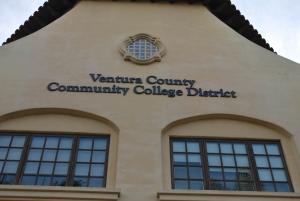
Courtesy photo.
CAMARILLO — Textbooks and supplies are often among the largest educational expenses college students face. As a result, 65% of college students have avoided purchasing textbooks due to prohibitive prices, according to a recent survey by the U.S. Public Interest Research Group Education Fund.
To make textbooks more accessible, the Ventura County Community College District (VCCCD) has implemented the Zero Textbook Cost (ZTC) program at Moorpark, Oxnard and Ventura colleges. The program enables students to use textbooks and online materials for their coursework at no charge. VCCCD students may average savings between $1,400 and $1,700 per year by taking classes that participate in the ZTC program.
“For many college students, the cost of textbooks can be a financial barrier to completing required coursework and that negatively impacts their grades,” said Chancellor Greg Gillespie. “The Zero Textbook Cost program empowers students attending the District’s colleges to save both time and money by connecting them with no-cost educational resources.”
“The program helped me save hundreds of dollars in books and allowed me to keep pursuing my higher education during these difficult times,” added Moorpark College student Adailton Nali Junior. “For a student with a family and child (which is my case), the program has allowed me to save money so I could pay for my bills and food. I could not have done it without the program, and I am really thankful for it.”
Resources vary by college, yet all of them depend on this program and Open Educational Resources (OER) to promote equity and successful academic outcomes for students, particularly those from disproportionately impacted communities. OER refers to free, openly licensed educational materials used for research, teaching and learning. They can exist in the public domain, or their licenses permit use or redistribution with few or no restrictions.
Courses achieve the ZTC designation in different ways. In some, a classroom set of books has been purchased that are loaned to students. In others, OER materials are provided to students digitally. If students want a print copy of a digital resource, they may have to pay a nominal fee to cover printing.
Districtwide, there is a wide selection of ZTC classes for students to choose from. A sampling includes courses in the areas of science, English, math, ethnic studies, languages and social sciences. VCCCD colleges are also adding a low textbook cost (LTC) designation, with books at $40 or less per class.
As a statewide leader in administering this program, Ventura College has 42% of its courses designated ZTC for the fall semester and is aiming for over 50% by 2022. The program receives support from the Ventura College Library and the Ventura College Foundation’s Lending Library.
For spring and fall 2021 semesters, Moorpark College designated 22% of its courses as ZTC. A total of 144 faculty members have remodeled their courses around free and open educational materials.
Oxnard College will offer 105, or nearly 16%, of its 672 classes as ZTC courses this fall. Faculty members are developing plans to have more classes incorporate ZTC and OER materials, with implementation likely occurring in the spring 2022 semester.
“During my career with K-12 school districts and the County Office of Education, I saw how financial challenges impact students and their families. VCCCD students shouldn’t have to choose between buying a textbook or paying for basic needs, like supplies for their children, food or rent,” said Trustee Stan Mantooth. “The ZTC program helps relieve that pressure so students can focus on their education.”
For more information about the Zero Textbook Cost program, visitvcccd.edu/zero-textbook-cost.
About Ventura County Community College District — The Ventura County Community College District is a member of the 116-campus California Community College system and serves approximately 31,000 students annually. The District’s three colleges–Moorpark, Oxnard and Ventura–offer programs in general education for degrees and certificates, transfer to four-year colleges and universities, career technical education, and provide opportunities to engage in co-curricular campus activities. For more information, please visit vcccd.edu
